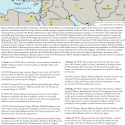 |
 |
Russia Security Update: November 3-10, 2015

Russian President Vladimir Putin indicated on November 10 that Russia was developing nuclear-capable strike systems that could penetrate NATO’s planned missile defense shield in Europe. Russian-backed separatists reignited hostilities on the front line in eastern Ukraine after a two-month operational pause that coincided with Russia’s deployments to Syria. Russia may be escalating operations in response to a November 4 EU leadership statement indicating that Europe may extend sanctions beyond January 2016. The EU statement indicated that Russia’s continued refusal to support the ceasefire agreement in Ukraine would trigger the extension of sanctions regardless of Russia’s attempts to position itself as a necessary partner in the fight against ISIS. Meanwhile, Russia reportedly finalized a long-stalled contract to supply Iran with advanced S-300 missile defense systems that could be delivered by 2017. Previous unfulfilled promises to provide the air defense system raise doubts over the veracity of new Russian statements. Russia continues to pursue stronger security ties with U.S. partners in order to strengthen its alternative regional counterterrorism alliance. President Vladimir Putin and the Emir of Kuwait agreed to enhance military-technical ties, while Putin’s envoy to Afghanistan announced preparations to sell Hind attack helicopters and small arms to Kabul. Russia’s parliamentary speaker, a member of Putin’s inner circle, visited Algeria and Tunisia to discuss counterterrorism efforts, reinforcing previous indicators that the Kremlin includes North Africa in the scope of its regional intervention. It remains unclear whether the possible bombing of a Russian airliner over the Sinai Peninsula and Putin’s subsequent flight ban to Egypt will create tension or accelerate Moscow’s efforts to incorporate Egypt into its regional axis.